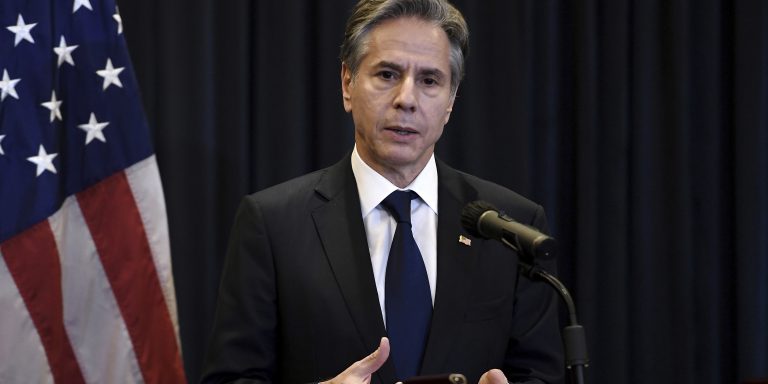INTELBRIEF
December 22, 2021
IntelBrief: Blinken’s Trip to Southeast Asia Intended to Shore Up Support from Regional Allies

Bottom Line Up Front
- U.S. Secretary of State Antony Blinken’s trip to Southeast Asia last week was intended to shore up support from regional allies and reinforce Washington’s commitment to the region in the face of a rising China.
- Many are concerned that without another alternative, China’s Belt and Road Initiative will become even more attractive to countries in the region.
- China has long been criticized for its predatory approach to diplomacy and statecraft, even as Beijing continues to invest in transportation infrastructure in the region, with projects in Laos, Vietnam, and Indonesia.
- While delivering his speech in Indonesia, Blinken referenced the importance of regional bodies and new partnerships, viewed as a cornerstone to the West’s latticework of alliances and relationships designed to counterbalance China.
U.S. Secretary of State Antony Blinken’s trip to Southeast Asia last week was intended to shore up support from regional allies while highlighting Washington’s enduring commitment to the Indo-Pacific region, particularly in the face of a rising China. Indeed, Beijing’s shadow loomed over most of Blinken’s trip, as the Secretary of State sought to provide an alternative to China’s growing influence throughout the region. Blinken also criticized China’s “aggressive action” in the Indo-Pacific, especially vis-à-vis Taiwan and the South China Sea, while also calling out Beijing’s shortcomings on human rights. In the broader framework of great power competition, every country on the geopolitical chess board remains “in play” as the U.S. and China grapple for influence, increasingly viewing bilateral relationships through a zero-sum lens. Dating back to the Obama administration, Washington has long sought to draw down its commitments in the Middle East in order to “pivot to Asia.” However, this strategy has been harder to realize in actuality due to continued tensions with Iran and ongoing instability in Iraq, Syria, and other geopolitical hotspots from the Levant to the Persian Gulf.
Outside of the Quad partnership between the U.S., India, Japan, and Australia, there are numerous U.S. allies in Southeast Asia—including Indonesia, Malaysia, Vietnam, Thailand, and Singapore, to name a few— concerned about investment, trade, diplomacy, and security issues. Numerous U.S. bilateral relationships in the region have been strained since former U.S. President Donald Trump abandoned the Trans-Pacific Partnership (TPP), a 12-country multilateral trade agreement crafted by the Obama administration and intended to boost economic ties with countries in the Indo-Pacific region. Many are concerned that without another alternative, China’s Belt and Road Initiative will become even more attractive. The Biden administration is still working to put together an official strategy toward the Indo-Pacific that will include initiatives on trade, technology, supply chains, and clean energy. While Blinken’s speech was peppered with all the right policy buzzwords, it will be more difficult to translate white paper talking points into action. This is especially true as the U.S. remains consumed with numerous domestic priorities, to include a new wave of coronavirus infections, and international issues outside of the Indo-Pacific region, including Russian aggression against Ukraine.
While delivering his speech in Indonesia, Blinken referenced the importance of regional bodies like the Association of Southeast Asian Nations (ASEAN) and new partnerships such as AUKUS, an accord between Australia, the United Kingdom, and the United States, viewed as a cornerstone to the West’s latticework of alliances and relationships designed to counterbalance China. Thailand’s former foreign minister from 2008 to 2011, Kasit Piromya, accused China of attempting to divide ASEAN members with its promises of trade and investment. Laos and Cambodia are more firmly ensconced in China’s orbit, while Vietnam and others remain more circumspect of Beijing’s actions, given historical tensions and China’s proclivity to bully smaller countries in the region. Cambodia has been critical of the U.S. for imposing sanctions for its connections to China’s military, including the latter’s use of Cambodia’s Ream Naval Base, located along the Gulf of Thailand.
The U.S. has promised billions of dollars in aid and investment while also engaging in vaccine diplomacy by donating more than 300 million vaccines to countries in the region “with no strings attached,” according to Blinken. China has long been criticized for its predatory approach to diplomacy and statecraft, even as Beijing continues to invest in transportation infrastructure in the region, with projects in Laos, Vietnam, and Indonesia. Blinken went on to criticize the junta in Myanmar and some of the atrocities carried out by the ruling military regime. The Secretary of State’s trip was cut short when a journalist in his entourage tested positive for COVID-19. Blinken expressed regrets about not being able to visit Bangkok as originally scheduled, yet he invited Thailand’s Deputy Prime Minister Don Pramudwinai to Washington at the earliest possible convenience in order to continue the conversation sparked by this trip.